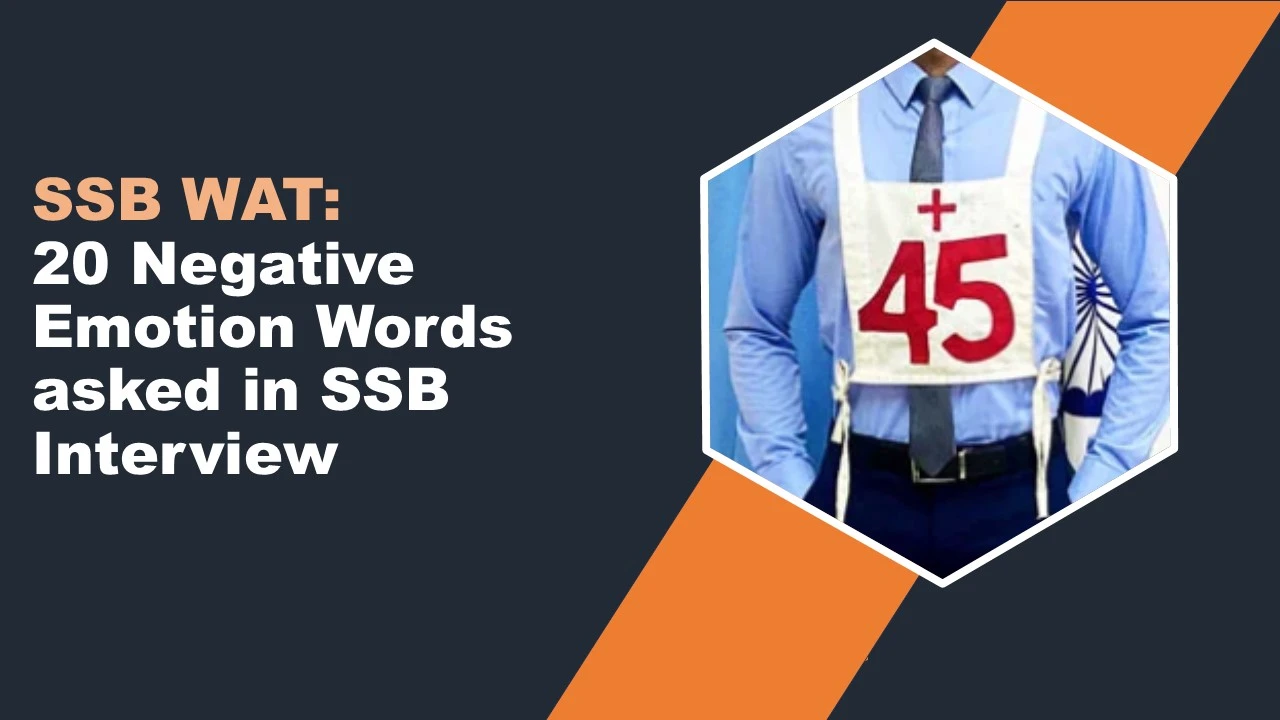SSB WAT - Negative Emotions
The Word Association Test (WAT) in the SSB Interview is designed to assess how candidates think and react under pressure. This psychological test presents words—sometimes negative in nature—where you must quickly form a sentence. Your response not only reflects your thought process but also showcases qualities essential for an officer.
This article explores the meanings of words related to various negative emotions and provides example sentences to help you turn these words into opportunities to demonstrate positivity and resilience.
Negative Emotions and Positive Responses
- Anger
- Meaning: A strong feeling of displeasure or hostility.
- Sentence: "Anger fuels constructive change."
- Sadness
- Meaning: A feeling of sorrow or unhappiness.
- Sentence: "Sadness deepens empathy."
- Fear
- Meaning: An unpleasant emotion caused by the belief that something is dangerous or a threat.
- Sentence: "Fear drives thorough preparation."
- Anxiety
- Meaning: A feeling of worry or unease, typically about an imminent event or something with an uncertain outcome.
- Sentence: "Anxiety prompts careful planning."
- Frustration
- Meaning: The feeling of being upset or annoyed due to an inability to change or achieve something.
- Sentence: "Frustration leads to innovation."
- Disappointment
- Meaning: Sadness or displeasure caused by the non-fulfillment of one’s hopes or expectations.
- Sentence: "Disappointment inspires renewed effort."
- Guilt
- Meaning: A feeling of responsibility or remorse for some offense or wrong.
- Sentence: "Guilt encourages making amends."
- Shame
- Meaning: A painful feeling of humiliation or distress caused by wrong or foolish behavior.
- Sentence: "Shame strengthens integrity."
- Loneliness
- Meaning: Sadness because one has no friends or company.
- Sentence: "Loneliness highlights connection."
- Grief
- Meaning: Deep sorrow, especially caused by someone's death.
- Sentence: "Grief honors cherished memories."
- Despair
- Meaning: The complete loss or absence of hope.
- Sentence: "Despair births new hope."
- Jealousy
- Meaning: Feelings of envy towards someone’s success or advantages.
- Sentence: "Jealousy motivates self-improvement."
- Hurt
- Meaning: Emotional or physical pain.
- Sentence: "Hurt teaches resilience."
- Embarrassment
- Meaning: A feeling of self-consciousness, shame, or awkwardness.
- Sentence: "Embarrassment fosters humility."
- Doubt
- Meaning: A feeling of uncertainty or lack of conviction.
- Sentence: "Doubt seeks clarity."
- Worry
- Meaning: A state of anxiety and concern about actual or potential problems.
- Sentence: "Worry drives action."
- Regret
- Meaning: A feeling of sadness or disappointment over something that has happened or been done.
- Sentence: "Regret guides better choices."
- Resentment
- Meaning: Bitter indignation at having been treated unfairly.
- Sentence: "Resentment teaches forgiveness."
- Boredom
- Meaning: A state of feeling weary and restless due to lack of interest.
- Sentence: "Boredom sparks creativity."
- Hopelessness
- Meaning: A feeling or state of despair and lack of hope.
- Sentence: "Hopelessness encourages hope."
In the SSB WAT, transforming negative emotions into positive sentences demonstrates optimistic thought process and quick-thinking required from a future officer. Use these examples to guide your practice, but ensure your responses are authentic and reflect your personal experiences.
With the right preparation, you can approach the WAT in SSB with confidence and showcase the qualities essential for success in the Indian Armed Forces.
Also, check our list of recommend books for SSB Interview preparation: 3 Best Books for SSB Interview Preparation.

